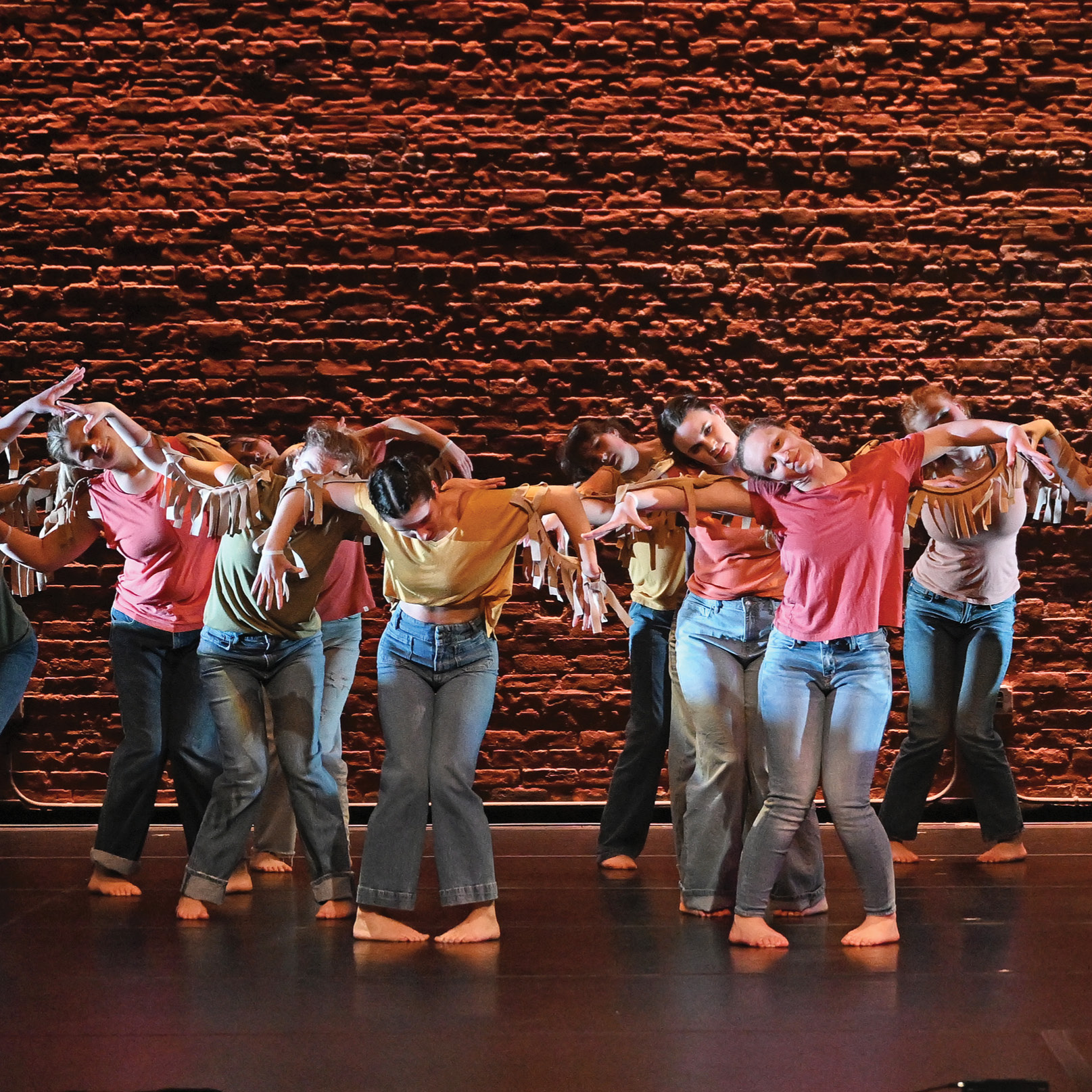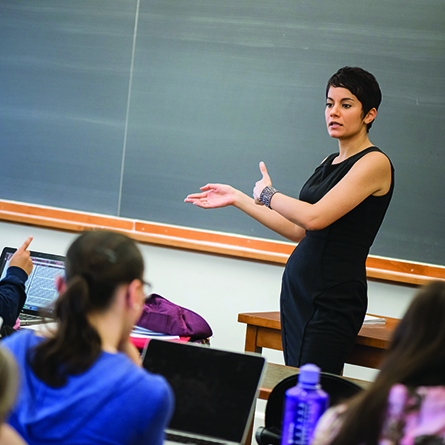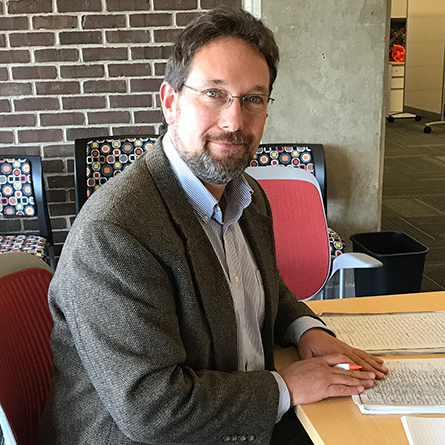
Global bodies: Q&A with Sociology Professor Afshan Jafar

Sociology Professor Afshan Jafar talks with Edward Weinman, editor of CC: Connecticut College Magazine, about the concept of beauty in a globalized world, whether Syrian refugees should be called migrants and what she thinks about Taco Bell.
Edward Weinman: You had never been to the U.S. until you went to college at Ohio Wesleyan University. I hear you had an interesting encounter with a customs official.
Afshan Jafar: When I was going through customs, the immigration officer told me that I should eat at Taco Bell.
EW: Why should someone from Karachi, Pakistan, eat at Taco Bell?
AJ: You see, people often think I’m from South America. They don’t quite know where to place me, and they do try to speak Spanish to me all the time. So the immigration officer told me that I should go and try Taco Bell. It was awful.
EW: You won the 2015 Feminist Activism Award from the national organization Sociologists for Women in Society. Your classes include “Gender, Culture and the Body” as well as “Sex, Gender and Society.” Do you ever discuss what it’s like for a Pakistani woman to be confused with someone from South America?
AJ: Pakistanis are hard to place geographically because from north to south you have such a variety of skin tones, hair colors, eye colors. Even just within my family, we have three people who could probably pass as white in some countries because they are light-skinned. And then there’s three of us who are slightly darker-skinned with darker features. There’s not a typical Pakistani face that you can place—like, “Oh. That person’s Pakistani.”
EW: Did you grow up conscious of your skin color?
AJ: I’m the youngest of six kids. I’m not one of the lighter-skinned kids in my family. Skin color is very big in Pakistan. The lighter you are the more beautiful you are considered. I have this memory of me as probably a 5- or 6-year-old girl and my aunt tells me, “People aren’t going to think that you’re beautiful, but you know, if you work on your personality and you are nice to people, they’ll like you. But you have to work on being nice.”
EW: Because you’re darker-skinned you wouldn’t be considered beautiful?
AJ: I always grew up assuming that I’m not going to be the one who’s considered beautiful. But then I came to the U.S. and, for example, when people talked about tanning [they would say to me], “Oh, you’re so lucky you don’t have to think about tanning.” I was thinking, “What is this world?” “What is happening?” “Why am I being told that this is the color people are trying to be?” It didn’t make sense.
EW: Did the ideas behind skin color influence your two most recent books, Global Beauty, Local Bodies (Palgrave Macmillan, 2013) and Bodies Without Borders (Palgrave Macmillan, 2013)?
AJ: You realize from these interactions how socially constructed the ideas are about beauty and bodies and what’s attractive and what’s not. So personally, this has always been there for me. And then when I started studying sociology and started talking more about norms and how we construct reality, I realized we actually shape our reality and we interpret it a particular way.
EW: If we shape and interpret our reality, then who decides what’s beautiful? How are these norms, such as tanned skin equals beauty, set?
AJ: I’ll give you the answer of a sociologist because that’s what I am. It has to do with power. Our norms aren’t just norms. Our ideals aren’t just ideals. They are norms, practices and ideals of those who hold power in a society. They are always to the benefit of some people and the detriment of others. Who has the power to shape those? We see throughout history it’s always been the ideals of the wealthy and powerful that people have admired. That’s the reason why, when you look at a couple of centuries ago, you have these plump women who were put up as the ideal because it reflected wealth. They were very pale women.
EW: Plump and pale because they didn’t have to be outside working?
AJ: Yes. They’re not doing manual labor, and they have a luxurious lifestyle that results in this particular body. And so that was the ideal, but the ideal starts to change. This ideal of a fit, tanned woman is the ideal of the wealthy because [you have leisure time to exercise] and the money, even in the winter, to travel to an exotic location and sunbathe. It’s the ideals of the wealthy that we see others trying to live up to.
EW: You write and lecture about bodies and beauty in the era of globalization. So how do you define what is beautiful?
AJ: [Laughing] I guess as a sociologist I would first ask why we need to define a beautiful body; why does a body need to be defined as beauty in the first place?
EW: It doesn’t, but it always is.
AJ: Yes, it always is. So I don’t think I can give you a straight answer for what a sociologist would consider a beautiful body because you can’t speak with one voice because everybody’s social location is going to matter. If you were to ask a feminist or a sociologist they would say just about anything can be beautiful—anything, anybody should be beautiful—but that’s not reality. We know that. That’s not how society sees it. Trying to come up with a definition of a beautiful body no matter what it is will eventually become just as restrictive as anything we have right now. That’s why I’m struggling with this question. I think the correct answer, from a sociologist’s perspective, is that there is no answer.
EW: With regards to beauty, you have said that wearing the hijab can be a sign of oppression as well as liberation. Can you explain?
AJ: When you live in a country where the hijab is mandated, you have to cover your head. Any mandated practice, no matter what and where it is, can become oppressive. By definition, the law has taken your choice away to dress yourself a particular way or not.
EW: And the hijab as liberation?
AJ: Tradition gets invented and reinvented and re-created all the time. What we’re seeing, currently, is a recreation of tradition. In England a few years ago, it was suggested that they might follow in France’s footsteps and try to ban the hijab or the burka. The sales of these items actually went up in England. So it becomes a form of protest: “You don’t get to tell me that I can’t do this because then I’m going to do it.” This is why in Western countries we are seeing a resurgence of the hijab. The hijab is an act of agency.
EW: During a TEDx talk, you said that the language we use to describe our reality shapes how we view it and understand it. There has been a debate as to whether Syrians fleeing their war-torn country are refugees or migrants. Why does it matter what term we use?
AJ: One of the things my students hear me repeat often is a sociological theorem: “Once you define something as real, it has real consequences.” Right now, whether we define people as refugees has real consequences in terms of whether they are allowed into a country or not. International conventions lay out rules for who can be turned away and who cannot or rather should not. Refugees should not be sent back to the countries they are fleeing and should be provided with basic necessities (according to international conventions). From a political and legal perspective, it matters a great deal whether we label someone a refugee or migrant.
EW: What about our cultural perception of the label refugee?
AJ: Looking at it from a cultural perspective, we tend to think of a refugee as somebody who needs our help. It’s not a relationship of mutual benefit, but a relationship between somebody who’s powerful and somebody who’s not. The point is that we think of refugees as not being beneficial to the country. Instead, we think of them as a burden. I think the word refugee is so embedded in connotations of weakness and helplessness, we don’t think they have anything to offer. We see them as a drain on our resources. So that’s not an easy label to live with.
EW: And a migrant?
AJ: With a migrant you can say they chose to leave one place and go to another, so this is an act of choice. On the one hand, this means that countries are more comfortable turning away people they label as migrants because they have a choice. So politically, countries can be very invested in giving that label versus “refugees.” On the other hand (my students suffer through a lot of “on the one hand” and “on the other hand”), culturally speaking, the label also brings with it certain rights and a responsibility to be a citizen of where they’re going. Migrants can work, maybe they have families here, they live here, they go to schools here. And so we’re more likely to see them or accept them as citizens. This is not to say that we do, but more so than compared to refugees.
EW: Sociology is depressing. At least, this is what you tell your students. Why?
AJ: I tell my students all the time that sociology is depressing. Sociology students are confronted by ideas about their life or their privilege—or their oppression—which they hadn’t thought about. This can be depressing. But I also tell them that I don’t ever want them to just throw up their hands and say, “Well ‘society’ tells us this or that.”
EW: You mean society tells us what’s beautiful and what words we should use to describe a displaced person? We don’t have any say in the matter?
AJ: Society doesn’t exist without us in it. So let’s talk about what our role is. We aren’t just placed on these tracks and just going wherever the tracks take us. To some extent sociology is telling us that there are larger forces than you, that your life isn’t just what you decided to make it, that your life turned out to be a whole combination of these cultural and structural opportunities that are available to you or not. But we have to acknowledge how and in what ways we can exercise what small amount of agency we have.
March 3, 2016
